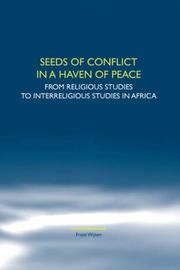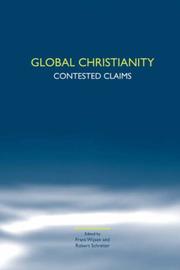| Listing 1 - 10 of 14 | << page >> |
Sort by
|

ISBN: 9401204284 1435612191 9781435612198 9042021888 9789042021884 9042021888 9789042021884 9789401204286 Year: 2007 Publisher: Amsterdam New York, NY Rodopi
Abstract | Keywords | Export | Availability | Bookmark
 Loading...
Loading...Choose an application
- Reference Manager
- EndNote
- RefWorks (Direct export to RefWorks)
On 7 August 1998 the American embassies in Nairobi and Dar es Salaam were bombed and 200 people lost their lives. These bombings shattered the image of Africa’s tradition of peaceful religious coexistence. Since then inter-religious dialogue has been high on the agendas of ecclesial and religious organisations, but not so much of faculties of theology and departments of religion in East Africa. This book investigates why this is so. How are interreligious relations dealt with in Africa, and more particularly, how are they and how should they be taught in institutions of higher learning? This book is based on fieldwork in Nairobi from 2001 onwards. It shows why Africa’s tradition of peaceful co-existence is not going to help Africa in the 21st century, and recommends a shift in the education in inter-religious relations: from religions studies to inter-religious studies.
Religions --- Religion. --- Interreligious relations --- Relations among religions --- Comparative religion --- Denominations, Religious --- Religion, Comparative --- Religions, Comparative --- Religious denominations --- World religions --- Civilization --- Gods --- Religion --- Religion, Primitive --- Atheism --- God --- Irreligion --- Theology --- Relations. --- 2000-2099 --- Africa --- Africa. --- Eastern Hemisphere --- 291 --- Godsdienstwetenschap: vergelijkend
Book
ISBN: 9789463724050 9789048553617 9463724052 Year: 2021 Publisher: Amsterdam Amsterdam University Press
Abstract | Keywords | Export | Availability | Bookmark
 Loading...
Loading...Choose an application
- Reference Manager
- EndNote
- RefWorks (Direct export to RefWorks)
Twintig jaar geleden startte in Nederland de discussie over 'het multiculturele drama'. Het idee dat de multiculturele samenleving een drama of illusie is, is sindsdien gemeengoed geworden. Twee decennia later maakt Frans Wijsen de stand van zaken op. Met de integratie van nieuwkomers is het gedurende de afgelopen halve eeuw steeds beter gegaan, maar de verdraagzaamheid van Nederlanders is afgenomen. Frans Wijsen meent dat 'het multiculturele drama' vooral een framing van feiten is. Dat was toen niet anders dan nu. Hij pleit voor een ander frame: de multiculturele samenleving als uitdaging
Sociology of culture --- religie --- interculturele communicatie --- culturele diversiteit --- Netherlands --- Religious pluralism --- Cultural pluralism --- Multiculturalism --- Cultural diversity --- Diversity, Cultural --- Diversity, Religious --- Ethnic diversity --- Pluralism (Social sciences) --- Pluralism, Cultural --- Religious diversity --- Culture --- Cultural fusion --- Ethnicity --- Pluralism (Religion) --- Pluralism --- Religion --- Religions --- Sociology of religion
Book
ISBN: 3034309449 9783034309448 Year: 2013 Publisher: Oxford ; New York : Peter Lang,
Abstract | Keywords | Export | Availability | Bookmark
 Loading...
Loading...Choose an application
- Reference Manager
- EndNote
- RefWorks (Direct export to RefWorks)
Islam --- Christianity and other religions --- Christianity and other religions --- Christianity and other religions --- Islam --- Christianisme --- Christianisme --- Christianisme --- Relations --- Christianity. --- Islam. --- Relations --- Christianisme --- Relations --- Islam --- Relations --- Relations
Book
ISBN: 3643905793 9783643905796 Year: 2015 Publisher: Wien Lit Verlag
Abstract | Keywords | Export | Availability | Bookmark
 Loading...
Loading...Choose an application
- Reference Manager
- EndNote
- RefWorks (Direct export to RefWorks)
Book
Year: 1988 Publisher: Heerlen Universiteit voor Theologie en Pastoraat
Abstract | Keywords | Export | Availability | Bookmark
 Loading...
Loading...Choose an application
- Reference Manager
- EndNote
- RefWorks (Direct export to RefWorks)
Eeen bundel opstellen over godsdienst en gezondheid in Afrika, Latijns-Amerika en Europa voor werkers in pastoraat en gezondheidszorg
Book
Year: 1994 Publisher: Nijmegen
Abstract | Keywords | Export | Availability | Bookmark
 Loading...
Loading...Choose an application
- Reference Manager
- EndNote
- RefWorks (Direct export to RefWorks)
Book
ISBN: 9789004309166 9789004309180 9004309187 9004309160 Year: 2016 Publisher: Leiden Boston
Abstract | Keywords | Export | Availability | Bookmark
 Loading...
Loading...Choose an application
- Reference Manager
- EndNote
- RefWorks (Direct export to RefWorks)
Discursive approaches to the study of religion have received a lot of attention recently. Making Religion brings together leading theorists in the field who explore the theoretical and practical dimensions of the analysis of religious discourse. The volume provides an overview of current debates in the field, extends and improves upon contemporary theories and methodologies, and contributes to the discipline more broadly by flagging the importance of this emerging field of research. The combination of theoretical reflection and practical application of discourse analysis as a tool to study religion opens up new perspectives for future research.
Religion --- 291 --- Methodology. --- Godsdienstwetenschap: vergelijkend --- Méthodologie --- Méthodologie --- Methodology

ISBN: 9401204322 1435612183 9781435612181 9042021926 9789042021921 9042021926 9789042021921 9789401204323 Year: 2007 Publisher: Amsterdam New York, NY Rodopi
Abstract | Keywords | Export | Availability | Bookmark
 Loading...
Loading...Choose an application
- Reference Manager
- EndNote
- RefWorks (Direct export to RefWorks)
In 2002 Philip Jenkins wrote The Next Christendom . Over the past half century the centre of gravity of the Christian world has moved decisively to the global South, says Jenkins. Within a few decades European and Euro-American Christians will have become a small fragment of world Christianity. By that time Christianity in Europe and North America will to a large extent consist of Southern-derived immigrant communities. Southern churches will fulfil neither the Liberation Dream nor the Conservative Dream of the North, but will seek their own solutions to their particular problems. Jenkins’ book evoked strong reactions, a bit to his own surprise, as the book contained little new. In the United States of America, the prospect of a more biblical Christianity caused reactions of alarm in liberal circles. In contrast, conservatives were delighted by the same prospect. In Europe the book landed in the middle of the debate on Europe as an exceptional case. It was detested by those who stick to the theory of ongoing and irreversible secularisation and welcomed by those who see a resurgence of religion, also in Europe. In the present volume, scholars of religion and theologians assess the global trends in World Christianity as described in Philip Jenkins’ book. It is the outcome of an international conference on Southern Christianity and its relation to Christianity in the North, held in the Conference Centre of Radboud University Nijmegen, the Netherlands.
Christianity --- Religions --- Church history --- Forecasting --- Jenkins, Philip, --- Criticism, Textual --- Church membership --- Membership, Church --- Church polity --- Confirmation --- Membership
Book
ISBN: 9789077311103 9077311106 Year: 2010 Publisher: Nijmegen Nijmeegs Instituut voor Missiewetenschappen
Abstract | Keywords | Export | Availability | Bookmark
 Loading...
Loading...Choose an application
- Reference Manager
- EndNote
- RefWorks (Direct export to RefWorks)
Dissertation
ISBN: 903900501X Year: 1993 Publisher: Kampen Kok
Abstract | Keywords | Export | Availability | Bookmark
 Loading...
Loading...Choose an application
- Reference Manager
- EndNote
- RefWorks (Direct export to RefWorks)
Christianity and culture --- Evangelistic work --- Catholic Church --- Sukumaland (Tanzania) --- Church history. --- Religion.
| Listing 1 - 10 of 14 | << page >> |
Sort by
|

 Search
Search Feedback
Feedback About UniCat
About UniCat  Help
Help News
News